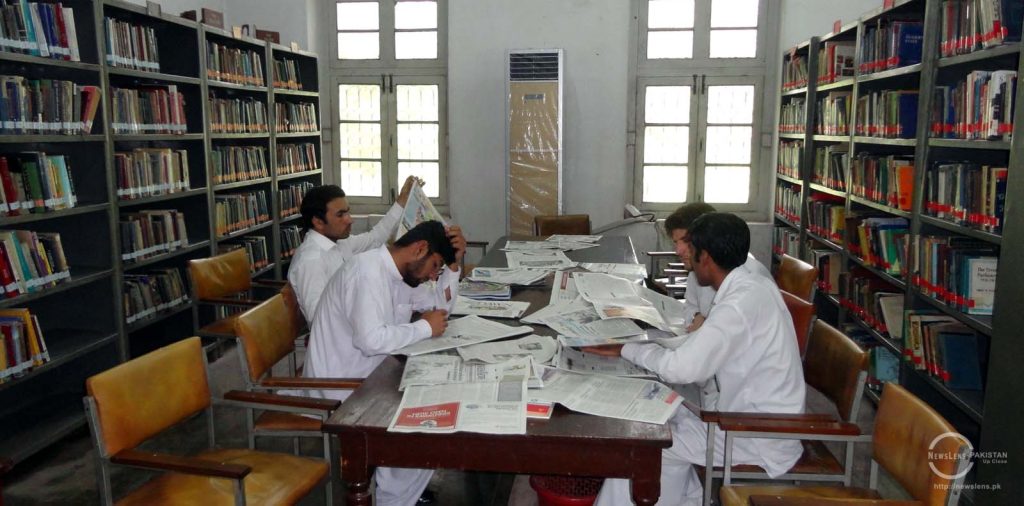
Peshawar: Rukhsana Habib has a thing of history. Every day, she spends hours pouring over the old manuscripts and historical material in the Islamia College liberary with the passion of a researcher.
“Reading old books is my favourite pastime and this library is the only place in the city that affords me historical books and a great environment for study,” said Rukhsana, who teaches political science at the Islamia college.
In the time between classes, Rukhsana can be found in the gloomy interiors of the city’s oldest library, reading or searching the library’s online archives for books to borrow.
“I have been to every library in the city and university departments and this is the only one where you can search the digital archives yourself,” Rukhsana told News Lens.
The Islamia College’s 100 year old library has been digitized in 2015, making available its 90,000 books and 1261 historical manuscripts to students and researchers at just a click of the keypad.
For a college whose establishment in 1913 laid the foundation of education in the province – then known as the Northwest Frontier Province under the British Raj in United India – the central library is among its precious assets. It is one the oldest in Khyber Pakhtunkhwa, containing rare books and manuscripts dating back hundred of years.
It is also one of the biggest. The building of library consists of two large halls and nine adjacent rooms. One hall and four rooms were added to the library in 1972.
Tehseen Ullah Khan, the librarian, told News Lens that the library was first in Khyber Pakhtunkhwa that had scanned thousands of rare books and made them available to the students with full text, through its online digital archives.
“The online system initiated this year has made searching books very easy for students,” said Khan. “Anyone can search his or her favorite book with just a click of the mouse.”
The library has initially allowed only students from Islamia Colllege and its staff to search and access books but in time the facility would be extended to everyone.
Khan said not just students and teachers from Islamia College but from all provinces could benefit from its online archives by visiting the library website.
Two separate computer labs have been established at the library for male and female students where internet connectivity is available to them for searching and studying books.
The library has several sections – oriental studies, periodicals and historical archives – but among its most popular is the “treasure of literary gems”.
The “general” section of the library contains the library’s English collection. The “oriental” section consists of publications in Urdu language.
The newspapers, magazines, journals and newsletters are available in “periodicals” section. But the library’s most precious and historical material such as manuscripts, old maps, pictures, scripts of Qaid-e-Azam Muhammad Ali Jinnah addresses and other rare historical material in different languages including Arabic, Persian, Pashto, Hindko and Urdu are placed in “treasure of literary gems” section.
Khan Zaman, a student of Bachelor of Arts (BA) at the Islamia Collage said the facilities available in the library made it easy for students to search a book online.
“The students can now borrow books or read them online,” he said.
One of the main attractions of the library of Islamia College Peshawar is its manuscripts collection.
“These are historical books composed and hand-written thousands of year ago,” said Khan. “Some of them are extremely and cannot be found even in the libraries of Europe and America.”
The handwritten manuscripts deal with various subjects including chemistry, physics, mathematics, religion and astronomy.
Khan said the oldest manuscript of the library was ‘Kitab-ul-Aghani” of the “Book of Afghans” written by Abul Farah Ali Bin Hussain Asfahani. It is almost 1200 years old.
The manuscript has four chapters. The first comprises biographies, the second physics, the third Arabic grammar and the fourth is poetry written in Arabic language.
The librarian said that there were a total of 1261 ancient manuscripts written in different languages on various subjects. Of these, 946 were in Arabic, 310 in Persian, 04 in Pashto and 01 in Punjabi.
The library has a separate section with a museum that has a rich collection of old historical pictures, belongings of the college founder Sir Shaibzada Abdul Qayum Khan.
The pictures gallery contain pictures of Islamia College Peshawar dating back to its construction in 1913, showing Qaid-e-Azam with the students of the college and Sir Sahibzada Abdul Qayum who laid the foundation of the Islamia College.
A visitor book is maintained at the museum where distinguished guests and visitors record their impressions about the library. The register has hand-written comments from the first Governor General of Pakistan Quaid-e-Azam Mohammad Ali Jinnah, an asset much prized by the library and one of perennial interest for visitors.
Zeeshan Anwar, a student of PhD, who visits the library for research said that the library gave him access to old and new books related to the subject of his research. He said his PhD dissertation was on ‘Women’s Role in Politics’ and he visited the library for study.
“I check online books related to my topic and then get it from library,” said Anwar. “Books that i can’t find online, i borrow from the library.”



